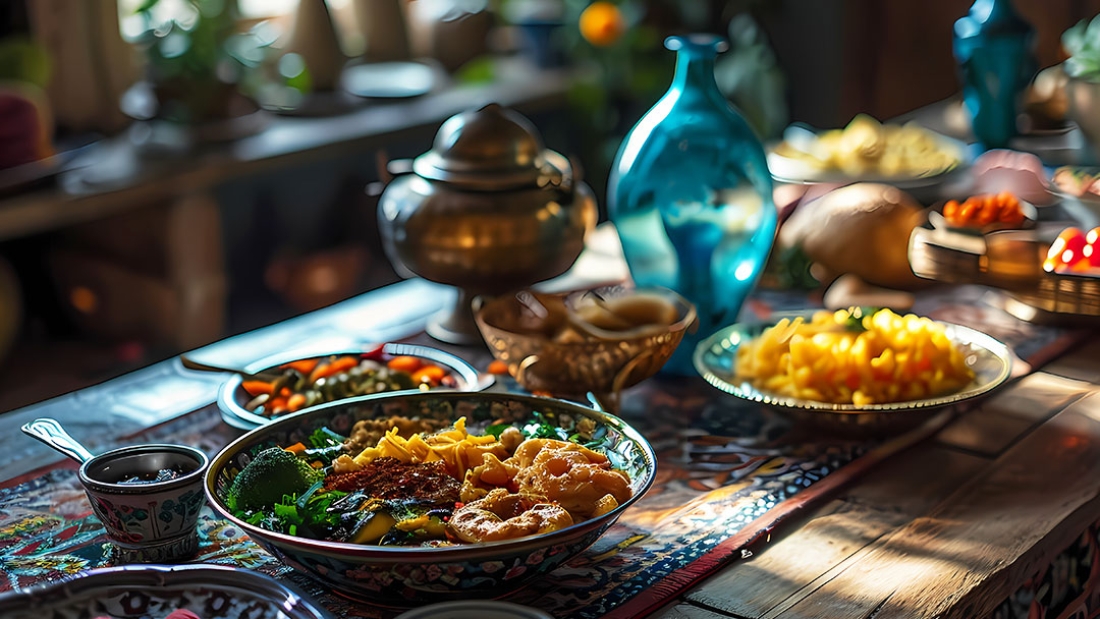Ramadan is a month of spiritual reflection, self-discipline, and fasting from dawn to sunset. However, maintaining a balanced diet during this period is crucial for sustaining energy levels, staying hydrated, and ensuring overall well-being. A well-planned Sehri and Iftar can help you avoid fatigue, dehydration, and digestive issues. This guide provides a complete Ramadan meal plan with healthy Sehri and Iftar ideas to keep you nourished throughout Ramadan.
Why a Balanced Ramadan Meal Plan is Important
Fasting for long hours can take a toll on your body if you don’t consume the right foods. A balanced meal plan ensures:
- Sustained energy levels throughout the day
- Proper hydration to prevent fatigue and headaches
- Essential nutrients for overall health
- Prevention of overeating and unhealthy cravings
Let’s explore a nutritious and well-balanced meal plan for both Sehri and Iftar.
Sehri: The Pre-Dawn Meal
Sehri is essential as it fuels your body for the entire day. A good Sehri should include complex carbohydrates, protein, healthy fats, and fiber to ensure sustained energy release. Here are some nutritious Sehri meal ideas:
1. Rice with Lentils and Vegetables
- Steamed rice with dal (lentil soup) for a protein and fiber boost
- Stir-fried or steamed seasonal vegetables like spinach, bottle gourd, or pumpkin
- A boiled egg or a piece of grilled fish for added protein
- A glass of water or a cup of milk tea for hydration
2. Whole Wheat Ruti with Eggs and Vegetables
- Scrambled or boiled eggs with mixed vegetables
- Whole wheat ruti or whole grain toast
- A side of yogurt for digestion
- A glass of water to stay hydrated
3. Homemade Yogurt with Chia Seeds and Berries
- High-protein homemade yogurt
- Chia seeds for fiber and omega-3s
- Fresh berries for antioxidants
- A handful of nuts for healthy fats
4. Lentil Soup with Brown Bread
- Lentil soup (dal) rich in protein and fiber
- A slice of whole grain bread
- A glass of water or a cup of green tea
Hydration Tips for Sehri:
- Drink 2-3 glasses of water before Fajr.
- Avoid excessive caffeine as it can lead to dehydration.
- Include hydrating foods like cucumbers, watermelon, and oranges.

Iftar: Breaking the Fast the Healthy Way
Iftar is the time to replenish energy levels and restore hydration. Breaking the fast with nutritious and easily digestible foods helps prevent bloating and fatigue. Here’s a healthy Iftar meal plan:
1. Start with Dates and Water
- Dates provide a quick source of natural sugars and energy.
- Water helps rehydrate the body after a long fasting period.
- You can also have coconut water for added electrolytes.
2. Light Soup for Digestion
- Lentil or chicken soup with minimal oil
- Helps prepare the stomach for the main meal
3. Grilled Chicken with Brown Rice and Vegetables
- Lean protein from grilled or baked chicken
- Brown rice or quinoa for complex carbs
- Steamed or sautéed vegetables for fiber and vitamins

4. Traditional Iftar with a Healthy Twist
- Sola (spiced chickpea salad) instead of fried items
- Baked samosas instead of deep-fried ones
- Roasted nuts instead of sugary sweets
5. Hydrating Drinks
- Fresh fruit juices without added sugar
- Laban (salted yogurt drink) to restore electrolytes
- Herbal teas like ginger or mint tea to aid digestion
Dessert Options
- Fresh fruit salad with yogurt
- Dates stuffed with almonds or walnuts
- Dark chocolate with nuts for a small treat
Additional Tips for a Healthy Ramadan Diet
- Avoid Overeating: Eat in moderation and listen to your body’s hunger signals.
- Limit Fried Foods: Opt for baked or grilled alternatives to reduce unhealthy fat intake.
- Stay Active: Light activities such as walking or stretching after Iftar help with digestion.
- Eat Slowly: Chew food properly to avoid indigestion and bloating.
- Get Enough Sleep: Proper rest helps the body recover and function efficiently.
Final Thoughts
A well-balanced meal plan during Ramadan can help maintain energy levels, promote better digestion, and ensure overall well-being. Prioritizing whole foods, staying hydrated, and avoiding excessive fried and sugary items will make fasting easier and healthier. By following this Sehri and Iftar guide, you can enjoy a nourishing and fulfilling Ramadan while keeping your health in check.


Leave A Comment